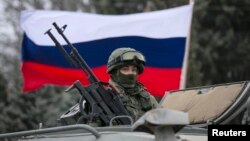Russia, has amassed around 20,000 combat-ready troops on Ukraine's eastern border, could use the pretext of a humanitarian or peace-keeping mission to invade, NATO warned on Wednesday.
"We share the concern that Russia could use the pretext of a humanitarian or peacekeeping mission as an excuse to send troops into eastern Ukraine," NATO spokeswoman Oana Lungescu said Wednesday.
At a news conference late Wednesday, U.S. President Barack Obama rejected - for now - calls to provide Ukraine with lethal military aid.
“If you start seeing an invasion by Russia, then that’s a different set of questions. We’re not there yet,” said Obama wrapping up a summit with African leaders in Washington.
He said instead that sanctions designed to hit hard at the Russian economy should be given more time to work.
“We’re doing exactly what we should be doing and we’re very pleased that our European allies and our partners joined us,” said Obama.
The White House has said Vice President Joe Biden discussed concerns about Russia’s most recent military build-up with Ukrainian President Petro Poroshenko in a phone call Wednesday.
"The two leaders expressed concern with Russian statements suggesting a role for Russian “peacekeepers” in Ukraine, with Russia’s ongoing military buildup on Ukraine’s border, and with Russia’s continuing transfer of weapons to Russian proxies in Ukraine," the White House said in a read-out of the call.
A day earlier, the Western military alliance said Russia has "significantly increased" the number of troops on its border with Ukraine in recent days, bringing the total there to around 20,000, along with a large number of tanks, infantry, special forces and aircraft.
Stating the conflict in Ukraine was fueled by Russia, NATO said in a statement that the troop build-up had further escalated “a dangerous situation.”
“We're not going to guess what's on Russia's mind, but we can see what Russia is doing on the ground - and that is of great concern,” Lungescu said in an emailed statement.
The concern of a possible invasion was echoed by U.S. Defense Secretary Chuck Hagel.
“When you see the buildup of Russian troops and the sophistication of those troops, the training of those troops, the heavy military equipment that's being put along that border, of course it's a reality and it's a threat. And it's a possibility, absolutely," said Hagel following a visit to U.S. European Command Headquarters.
'Significant re-buildup'
Late last month, U.S. Deputy National Security Adviser Tony Blinken said there had been "a significant re-buildup of Russian forces along the border, potentially positioning Russia for a so-called humanitarian or peacekeeping intervention in Ukraine."
Also Wednesday, Polish Prime Minister Donald Tusk said that the threat of Russian intervention in Ukraine has risen over the past few days.
"We have reasons to suspect - we have been receiving such information in the last several hours - that the risk of a direct intervention is higher than it was several days ago," Tusk told reporters in Warsaw.
Moscow denies Western accusations that it has armed and supported rebels who are fighting Ukrainian forces in eastern Ukraine. It announced new military exercises to take place all this week, involving bombers and warplanes on Monday in a show of strength near the border with Ukraine.
'Combat readiness'
Meanwhile, Russian Defense Minister Sergei Shoigu said Wednesday that the peacekeeping units of Russia's armed forces need to be in a state of "constant combat readiness."
He made his comments while observing drills conducted by a peacekeeping unit at a base in southern Russia's Samara region.
NATO said early this year that Russia had amassed some 40,000 troops close to the Ukraine border. By June, the number had dropped to less than 1,000, but then Russia started building the force up again.
The comments came as intense fighting between Ukrainian government forces and pro-Russian separatists continued in eastern Ukraine.
A Ukrainian military spokesman said Wednesday that 18 servicemen had been killed and 54 wounded in fighting over the previous 24 hours.
UN meeting
On Tuesday Russia urged the United Nations to take immediate action to deal with the humanitarian crisis in Ukraine, but the U.S. said Russia has the means to stop it.
At an emergency Security Council meeting called by Russia Tuesday, Ambassador Vitaly Churkin said international humanitarian principles need to be followed in eastern Ukraine. He criticized the government in Kyiv for what he calls its violent repression of the region.
Deputy U.S. Ambassador Rosemary DiCarlo said Russia could stop all of it by halting the flow of fighters, weapons and money to the separatists. But she said Russia has instead doubled the number of troop battalions near the border and plans large-scale military exercises.
U.N. official John Ging told the council the humanitarian situation is getting worse in Ukraine especially because of violence in urban areas. He said many who have fled their homes do not register with officials, making it hard to assess relief needs.
MH17 investigation, recovery suspended
Dutch Prime Minister Mark Rutte has recalled investigators probing the shootdown of Malaysian Airlines flight MH17 over eastern Ukraine, saying fighting near the crash site makes it too dangerous to continue.
Rutte, speaking Wednesday in The Hague, also gave no timetable for resuming the search for human remains. He said only that the effort will continue when Ukraine is "more stable."
Flight MH17, with 298 people on board, was downed July 17 near the city of Donetsk, in an area controlled by pro-Russia rebels. Most of the victims on the Amsterdam-to-Kuala Lumpur flight were Dutch. There were no survivors. Authorities say 228 coffins with remains have so far been returned to the Netherlands.
VOA's Jeff Seldin contributed to this report; some information provided by Reuters.





